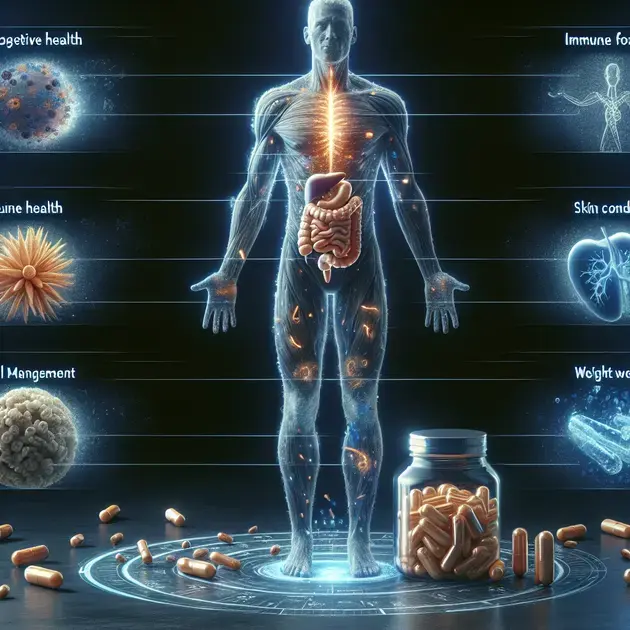Understanding the Role of Probiotics is crucial in today’s world, where gut health is becoming increasingly recognized as essential for overall well-being. Probiotics are live bacteria and yeasts that are good for your health, especially your digestive system. They are often referred to as “good” or “friendly” bacteria because they help maintain the natural balance of organisms in the intestines.
Research has shown that probiotics can help with various health issues, including digestive disorders, immune function, and even mental health conditions. As the interest in probiotics continues to grow, more studies are being conducted to explore their potential benefits in different areas of health and wellness. Understanding what probiotics do and how they can impact our bodies is key to taking control of our health.

The Benefits of Probiotics for Digestive Health
Probiotics are live bacteria and yeasts that are good for your health, especially your digestive system. These microorganisms can help maintain a healthy balance of gut bacteria and improve digestion. One way to incorporate probiotics into your diet is by consuming fermented foods like yogurt, kefir, sauerkraut, and kimchi. Another option is to take probiotic supplements, which are available in various forms such as capsules and powders.
To maximize the benefits of probiotics for digestive health, it is important to choose a high-quality supplement that contains a variety of beneficial strains. You can find detailed reviews and recommendations for probiotic supplements on health websites like Healthline or WebMD. Before starting any new supplement regimen, consult with a healthcare professional to ensure it is suitable for your individual needs.
Additionally, maintaining a balanced diet rich in fiber, fruits, and vegetables can also support the growth of beneficial gut bacteria. Regular exercise and staying hydrated are other factors that can contribute to a healthy digestive system. By incorporating probiotics into your daily routine and adopting healthy lifestyle habits, you can experience improved digestive health and overall well-being.
Unlocking the Potential of Probiotics for Immune Support
Probiotics play a crucial role in supporting the immune system by promoting a healthy balance of gut bacteria. A strong immune system is essential for defending the body against infections and diseases. To harness the full potential of probiotics for immune support, it is recommended to choose a probiotic supplement with strains that specifically target immune health.
You can explore different probiotic brands and their immune support formulations on reputable online platforms like Amazon or iHerb. Reading customer reviews and product descriptions can help you make an informed decision when selecting a probiotic supplement. It is advisable to follow the recommended dosage instructions provided by the manufacturer to achieve optimal immune support benefits.
In addition to taking probiotic supplements, maintaining a healthy lifestyle through regular exercise, balanced nutrition, and sufficient sleep is crucial for supporting overall immune function. By incorporating probiotics into your wellness routine and adopting immune-boosting habits, you can unlock the potential of probiotics for enhancing your immune system.
Exploring the Connection Between Probiotics and Mental Health
Recent research has highlighted the link between gut health and mental well-being, suggesting that probiotics may have a positive impact on mental health. The gut-brain axis is a communication network between the gastrointestinal tract and the brain, playing a key role in regulating emotions and mood. Probiotics can influence this axis by modulating gut bacteria and producing neurotransmitters that affect mental health.
To explore the connection between probiotics and mental health, consider incorporating probiotic-rich foods like yogurt and kefir into your diet. Additionally, you can try mindfulness meditation or relaxation techniques to reduce stress and support mental wellness. Online platforms such as Headspace or Calm offer guided meditation sessions and stress-relief exercises to help improve mental health.
Consulting with a healthcare provider or a registered dietitian can provide personalized recommendations on probiotic supplementation and dietary changes to support mental well-being. By integrating probiotics into your nutrition plan and engaging in mental health practices, you can potentially enhance your emotional resilience and cognitive function.

Unlocking the Power of Probiotics for Skin Health
Probiotics are live bacteria and yeasts that are good for your health, especially your digestive system. But did you know that these beneficial microorganisms can also provide a boost to your skin health? Research has shown that probiotics can help improve the skin’s natural barrier function, leading to better hydration and overall skin health. By promoting the growth of good bacteria on the skin, probiotics can help reduce inflammation and acne, resulting in a clearer and more radiant complexion.
Furthermore, probiotics can also help in combating skin conditions such as eczema and rosacea. By balancing the skin’s microbiome, probiotics can help reduce the symptoms of these conditions and provide relief to those suffering from sensitive skin. Incorporating probiotic skincare products into your daily routine can help support your skin’s natural defenses and promote a healthy and glowing complexion.
In addition to topical applications, incorporating probiotics into your diet can also benefit your skin health. Consuming probiotic-rich foods such as yogurt, kefir, and fermented vegetables can help improve your gut health, which is closely linked to your skin health. By maintaining a healthy gut microbiome, you can promote clearer, healthier skin from the inside out.
Overall, unlocking the power of probiotics for skin health involves a holistic approach that combines both topical and internal use of these beneficial microorganisms. By incorporating probiotics into your skincare routine and diet, you can experience the transformative effects of probiotics on your skin, leading to a brighter, healthier complexion.
Investigating the Relationship Between Probiotics and Weight Management
The relationship between probiotics and weight management has been a topic of interest in recent years, as emerging research suggests that gut health plays a crucial role in regulating metabolism and weight. Probiotics are known to promote a healthy balance of gut bacteria, which can affect how our bodies absorb nutrients and store fat. By supporting a diverse and balanced gut microbiome, probiotics can help improve digestion and metabolism, potentially aiding in weight management.
Studies have shown that certain strains of probiotics may have a positive impact on weight loss and fat reduction. These beneficial bacteria can help regulate appetite, increase feelings of fullness, and even decrease the absorption of dietary fat. By incorporating probiotic-rich foods or supplements into your diet, you may be able to support your weight management goals and promote a healthier body composition.
Furthermore, probiotics can also play a role in reducing inflammation and oxidative stress, which are often associated with weight gain and obesity. By addressing these underlying factors, probiotics may help in preventing weight-related health issues and promoting overall well-being. However, it is essential to note that individual responses to probiotics may vary, and more research is needed to fully understand the impact of probiotics on weight management.
In conclusion, investigating the relationship between probiotics and weight management is a complex and evolving field of research. While promising findings suggest that probiotics may play a role in supporting weight loss and metabolic health, more studies are needed to determine the specific strains and dosages that are most effective. By incorporating probiotics into a healthy lifestyle, you may be able to harness their potential benefits for weight management and overall wellness.
Decoding the Impact of Probiotics on Oral Health
Probiotics have gained attention for their role in promoting gut health, but their benefits extend beyond the digestive system. Research has shown that probiotics can also have a positive impact on oral health by helping to maintain a healthy balance of bacteria in the mouth. By inhibiting the growth of harmful bacteria that cause tooth decay and gum disease, probiotics can contribute to a healthier oral microbiome and overall dental well-being.
Specific strains of probiotics, such as Lactobacillus and Bifidobacterium, have been studied for their potential effects on oral health. These beneficial bacteria can help reduce plaque formation, decrease the risk of cavities, and even improve bad breath. By incorporating probiotic-rich foods or supplements into your daily routine, you may be able to support a healthy oral microbiome and reduce the risk of common dental problems.
In addition to direct effects on oral health, probiotics may also have systemic benefits that impact overall health. Research suggests that oral health is closely linked to conditions such as heart disease, diabetes, and respiratory infections. By promoting a healthy oral microbiome through probiotic use, you may be able to reduce the risk of these systemic health issues and support your overall well-being.
Overall, decoding the impact of probiotics on oral health involves understanding the intricate relationship between the oral microbiome and overall health. By incorporating probiotics into your daily oral care routine, you can support a healthy balance of bacteria in the mouth, reduce the risk of dental problems, and potentially improve your overall health outcomes.
Conclusion
In conclusion, probiotics offer a multifaceted approach to enhancing skin, weight management, and oral health. The power of probiotics in skincare aids in fortifying the skin’s natural defenses, resulting in improved hydration, reduced inflammation, and a clearer complexion. By integrating probiotics into both topical products and diet, individuals can experience a holistic transformation in their skin health, achieving a radiant and healthier complexion.
When exploring the connection between probiotics and weight management, it becomes clear that these beneficial bacteria play a pivotal role in supporting gut health, digestion, and metabolism. Studies suggest that specific strains of probiotics can aid in weight loss, regulate appetite, and mitigate inflammation, contributing to a healthier body composition. Incorporating probiotic-rich foods or supplements into one’s diet can potentially cultivate a diverse gut microbiome, supporting weight management goals and overall well-being.
Moreover, the impact of probiotics on oral health reveals a promising avenue for maintaining a healthy mouth microbiome. By inhibiting the growth of harmful bacteria, probiotics can prevent tooth decay, gum disease, and bad breath, promoting optimal dental well-being. With implications that extend beyond oral health, probiotics may also contribute to preventing systemic health issues linked to oral health conditions, underscoring the importance of oral microbiome balance.



